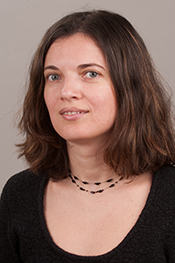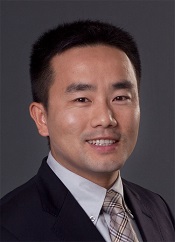CURENT Holds Invited Guest Seminars on Thursday, October 25 and Friday, October 26
CURENT Special Seminars
Special Seminar - Thurs., Oct. 25
All EECS Faculty and Students are invited.
Presenter: Dr. Doina Caragea, Kansas State University
Time: Thursday, October 25th, 12:20 PM - 1:10 PM EST
Location: Min H. Kao Building, Room 124 (there will be pizza for attendees)
Title: Collecting, processing and analyzing crisis data to enhance situational awareness
Abstract: Disaster-affected communities are increasingly becoming the source of big (crisis) data during and following major disasters. At the same time, big data have the potential to become an integral source of information for response organizations, as they can help enhance the situational awareness and facilitate faster response where is most needed. Despite such benefits, the challenges presented by big data preclude organizations from using them routinely. Manually sifting through voluminous streaming data to filter useful information in real time is inherently impossible. We study machine learning solutions to help emergency response organizations deal with the overload of relevant information, in real time, to improve situational awareness. Our proposed machine learning solutions have the potential to transform the way in which crisis response organizations operate, and, in turn, to provide better support to the victims of disasters in a timely fashion.
Bio: Doina Caragea, Ph.D., is a Professor at Kansas State University. Her research and teaching interests are in the areas of machine learning, data mining, data science, information retrieval and text mining, with applications to crisis informatics, security informatics, recommender systems, and bioinformatics. Her projects build upon close collaborations with social scientists, security experts and life scientists, and aim to provide practical computational approaches to address real-world challenges. Dr. D. Caragea received her PhD in Computer Science from Iowa State University in August 2004, and was honored with the Iowa State University Research Excellence Award for her work. She has published more than 100 refereed conference and journal articles. Her research has been supported by several NSF grants. Dr. Caragea is a member of the Association for Computing Machinery (ACM), and the faculty advisor for the local chapter of the ACM-W (Women in Computing).
Special Seminar - Fri., Oct. 26
Presenter: Dr. Chengbin Ma, University of Michigan–Shanghai Jiao Tong University Joint Institute, Shanghai Jiao Tong University
Time: Friday, October 26th, 10:10 AM - 11:00 AM EST
Location: Min H. Kao Building, Room 405
Title: System-level Design, Control, and Wireless Charging of Energy Systems
Abstract: This presentation summarizes our activities in the areas of energy management and megahertz wireless power transfer, especially at system-level designs and control aspects. Modeling and control of a hybrid energy system are fist explained. Multi-agent modeling and game theory-based control are proposed and combined as a general solution for the energy management of such multi-source energy systems. This unique solution fully respects and balances different preferences of components, and thus improves scalability and performances at both component-level and system-level. Problem of managing a larger energy system, such as a microgrid with renewable energy, energy storage, and plugged-in electric vehicles (EVs), is further formulated to reflect EV’s charging priority, driver’s price sensitivity and range anxiety. A new direction on demand-side management of spatial and temporal distributions of EV fleet charging and its framework will also be mentioned.
In addition, our work on system-level design of high performance megahertz (MHz) wireless power transfer (WPT) systems will be explained, Operation in the MHz frequency band presents technical challenges due to the potentially increased power losses, strong nonlinearities of the devices, and the electromagnetic interference (EMI) problem. Both the feedback-based active control and passive design are developed to improve the robustness of the MHz WPT system when there are variations in the coil relative position and final load, the two major sources of uncertainties. The Class E topologies are particularly applied to improve efficiency and facilitate optimization-based designs. Finally, recent efforts on multiple-receiver MHz WPT systems are mentioned such as design of a current-mode Class E PA, analysis and compensation of cross coupling, and decoupled load power distribution with a scalable number of receivers.
Bio: Chengbin Ma received the B.S. degree in industrial automation from East China University of Science and Technology, Shanghai, China, in 1997, and the M.S. and Ph.D. degrees in electrical engineering from The University of Tokyo, Tokyo, Japan, in 2001 and 2004, respectively. From 2004 to 2006, he was an R&D Researcher with the Servo Motor Laboratory, FANUC Limited, Japan. Between 2006 and 2008, he was a Postdoctoral Researcher with the Department of Mechanical and Aeronautical Engineering, University of California, Davis, USA. He joined the University of Michigan–Shanghai Jiao Tong University Joint Institute, Shanghai Jiao Tong University, Shanghai, China, in 2008, and currently an Associate Professor of electrical and computer engineering. His research interests include energy management, megahertz wireless power transfer, dynamics and motion control, and wide applications in electronic devices, electric vehicles, microgrids, smart grids, etc.
Dr. Ma is an IEEE senior member. He serves as Chair of Energy Storage Technical Committee and Chair of Shanghai Chapter, IEEE Industrial Electronics Society. He is an Associated Editor for the IEEE Transactions on Industrial Informatics (email: chbma@sjtu.edu.cn; lab: http://umji.sjtu.edu.cn/lab/dsc/; personal: https://sites.google.com/view/chbma17/home).

